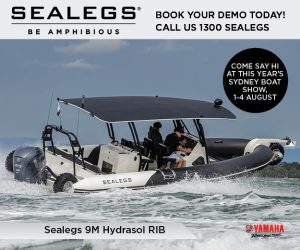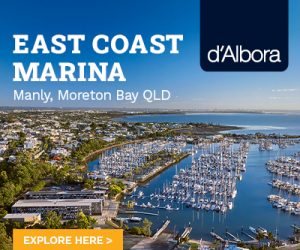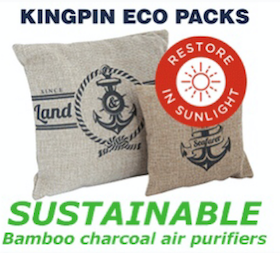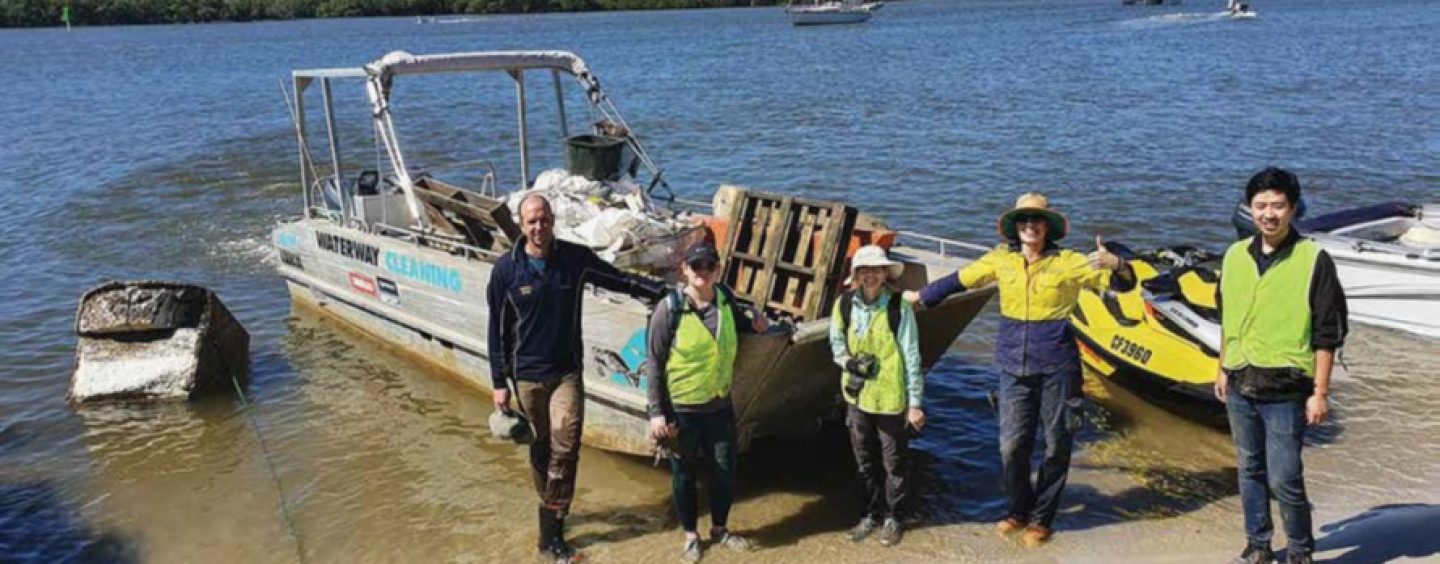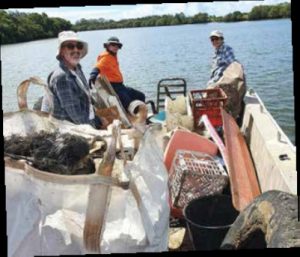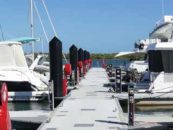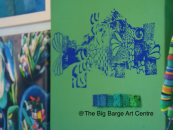Interview by Roselle Tenefrancia
Ocean Crusaders Foundation was founded in 2010 after seeing
dead turtles caught in rubbish. These environmental crusaders
strive to educate people, while physically cleaning up.
Who does not enjoy boating on the Gold Coast waterways? The weather is always perfect. We have five rivers, and 270km of navigable waterways. We have 774 hectares of lakes and dams. The Broadwater, with its small islands and sandbars, is home to diverse species of flora and fauna. How can one not love our waterways? But while we are able to enjoy the generally clean environment, we may be unaware of all the rubbish that accumulates as we go about our boating adventures. We chat with Ian Thomson, the founder and managing director of Ocean Crusaders, who shares with us what type of cleanup they do, and how the activities entail more than just picking up rubbish on the shores.
What made you start cleaning up SEQ waterways?
We landed in Brisbane after sailing around the world and seeing the issue in the South Pacific Islands first hand. We transformed Ocean Crusaders from an education team to actually getting out there and removing the debris that is already out there and using the images of boat load after boat load of debris to educate people that even our own backyard needs a lot of help.
What were the locations that you have conducted clean-ups in?
Through funding from the Federal Government’s Communities Environment Program, we were given funding to clean the Southern Moreton Bay Islands, South Stradbroke, Wave Break Island and Coomera River to name a few.
STATISTICS (2020) ON RUBBISH COLLECTED:
- South Stradbroke – 7,270kg – 11-day program on the eastern beach (8 days) and northern campgrounds (3 days)
- Coomera River Clean Up – 12,050kg – 11-day program that cleaned from the mouth to GCCM
- Southern Moreton Bay Islands – 15,630kg – 15 days focussed around Browns Inlet and Jacobs Well
- Wave Break Island – 1,750kg – 2-day community event
Please describe the types of rubbish collected from our waterways.
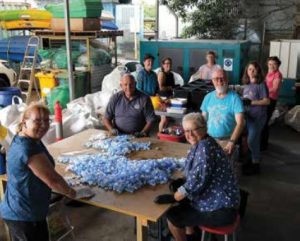 Coomera River had a lot of flood debris, but there was also a lot of pontoon fendering, fenders, hats, boat cushions and ropes from boats. Southern Moreton Bay Islands and Wave Break Island saw a lot of debris from live-aboards including carpets, BBQ’s, mattresses all hidden up in the bushes. Also, a lot of glass bottles obviously tossed off yachts with many of them smothering the mangroves.
Coomera River had a lot of flood debris, but there was also a lot of pontoon fendering, fenders, hats, boat cushions and ropes from boats. Southern Moreton Bay Islands and Wave Break Island saw a lot of debris from live-aboards including carpets, BBQ’s, mattresses all hidden up in the bushes. Also, a lot of glass bottles obviously tossed off yachts with many of them smothering the mangroves.
South Stradbroke campgrounds saw debris from boaters who go camping with marquees, broken chairs etc, just left behind. The eastern beach saw a lot of debris washed out of the Seaway, including lots of Gold Coast parking tickets.
How do you measure success in terms of the activities that you have conducted?
Is success judged by how much you remove or going out and finding the place clean? Unfortunately for us, we need more funding as the amount of debris out in the mangroves around the Gold Coast is unbelievable. Unless you come out and see it for yourself, you just can’t make people understand. Everyone who does come out, their lives change, as it is a real slap in the face to see how we are treating our waterways.
The Gold Coast City Council have a clean-up program that sees three boats on the water every weekday. However it is targeted on constructed areas and they are advised not to clean natural areas. So if you have a palm frond on the rock wall of your mansion, they will come and get it; however, the mangroves that line the waterways are never touched.
How can we make people aware of the consequences of the rubbish problem in and on our waterways?
Fishermen complain that there are not enough fish, yet we find lots of bait bags in the waterways. 90% of fish in the ocean have plastic toxins in them, while 30% have plastic remnants in them. And we consume a credit card size of plastic every month per person. I am not sure how we educate the human race. We seem hell bent on self-destruction and to hell with the environment! Some boaties have no respect for the waterways; all they want is to enjoy every weekend. It is only through magazines like yours that reach the masses, and articles like this that we can hopefully make a difference and open some eyes.
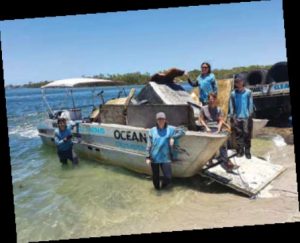 While 1,000 rivers produce 80% of the debris hitting the oceans, we have seen our local wildlife suffering from our debris. We have to stop blaming every other country and actually fix our own backyard first. We live in the greatest place in the world and to keep it that way we need to play our part. Otherwise our waterways will end up like those overseas. We don’t fish in international waters when we go out for a weekend; we fish in local waters and it is local debris that is hurting our local marine-life. We’ve all heard about plastic bags and turtles, but our fish life is suffering too. We want a healthy fish population and we certainly don’t want to be eating plastics in our fish. I believe we have to think globally but act locally. The best part of COVID is we are forced to enjoy what we have and many are realising that Australia is the place to be.
While 1,000 rivers produce 80% of the debris hitting the oceans, we have seen our local wildlife suffering from our debris. We have to stop blaming every other country and actually fix our own backyard first. We live in the greatest place in the world and to keep it that way we need to play our part. Otherwise our waterways will end up like those overseas. We don’t fish in international waters when we go out for a weekend; we fish in local waters and it is local debris that is hurting our local marine-life. We’ve all heard about plastic bags and turtles, but our fish life is suffering too. We want a healthy fish population and we certainly don’t want to be eating plastics in our fish. I believe we have to think globally but act locally. The best part of COVID is we are forced to enjoy what we have and many are realising that Australia is the place to be.
We have so much to offer, so let’s look after our backyard.
What actions can ordinary people like us take?
The best place to start a clean-up is by not purchasing items in the first place. If you buy it, it has the potential to end up in our oceans. 50% of plastic bags in the ocean come from landfill. If you go to Stapylton Landfill you will see the debris that blows around and the amount of birds that then go to our local waterways, often carrying debris with them. We need to stop it at the shop. However, we have seen success stories in Moreton Bay. It took us three years to clean Green Island, a small island off Manly. Last year we didn’t need to go out there as there was not enough debris for a huge event. Instead, we did a one day clean-up and covered the entire island with just six people. If we get rid of the generations of build-up, we can then maintain the environment. But first we need to get rid of the generations of build-up that have been neglected.
Everyone can play a part. When people go boating, just taking the time to make sure you leave the place better than you found it makes a difference. They’re our waterways, our playground, our future. If everyone did this, we would move forward.
Visit www.oceancrusaders.org to learn more about what they do and how you can support them.
Did you know that in the period 2018-19, Australia generated 75.8 million tonnes of solid waste, and that $17billion was spent on waste services in the same period. According to data, sectors generating the most waste were manufacturing (16.9%), construction (16.8%), households (16.3%), and electricity, gas and water services (14.4%). Plastic waste accounts for 3% of total waste documented, and households are the largest contributor of plastic waste (47% of plastic waste) followed by manufacturing (15% of plastic waste). All plastic types had the worst recovery rates of around 15%. Of 2.5 tonnes generated, 84% is sent straight to landfill.
(Recovered waste refers to waste materials sent for recycling, used for energy production or exported. Higher recovery rates represent more reusable materials and a more circular economy.)
Published in print July-September 2021
Published in print July-September 2021












